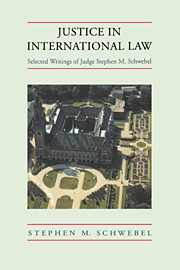Book contents
- Frontmatter
- Contents
- Preface
- PART I International Court of Justice
- 1 Reflections on the Role of the International Court of Justice
- 2 Relations Between the International Court of Justice and the United Nations
- 3 Was the Capacity to Request an Advisory Opinion Wider in the Permanent Court of International Justice than it is in the International Court of Justice?
- 4 Authorizing the Secretary-General of the United Nations to Request Advisory Opinions of the International Court of Justice
- 5 Preliminary Rulings by the International Court of Justice at the Instance of National Courts
- 6 Chambers of the International Court of Justice Formed for Particular Cases
- 7 Three Cases of Fact-Finding by the International Court of Justice
- 8 Indirect Aggression in the International Court
- 9 Human Rights in the World Court
- PART II International Arbitration
- PART III United Nations
- PART IV International Contracts and Expropriation
- PART V Aggression under, Compliance with, and Development of International Law
- List of publications
- Index
9 - Human Rights in the World Court
Published online by Cambridge University Press: 06 November 2009
- Frontmatter
- Contents
- Preface
- PART I International Court of Justice
- 1 Reflections on the Role of the International Court of Justice
- 2 Relations Between the International Court of Justice and the United Nations
- 3 Was the Capacity to Request an Advisory Opinion Wider in the Permanent Court of International Justice than it is in the International Court of Justice?
- 4 Authorizing the Secretary-General of the United Nations to Request Advisory Opinions of the International Court of Justice
- 5 Preliminary Rulings by the International Court of Justice at the Instance of National Courts
- 6 Chambers of the International Court of Justice Formed for Particular Cases
- 7 Three Cases of Fact-Finding by the International Court of Justice
- 8 Indirect Aggression in the International Court
- 9 Human Rights in the World Court
- PART II International Arbitration
- PART III United Nations
- PART IV International Contracts and Expropriation
- PART V Aggression under, Compliance with, and Development of International Law
- List of publications
- Index
Summary
The International Court of Justice is not a human rights court in the contemporary sense of that term. The Statute of the Court provides, in Article 34, that: “Only States may be parties in cases before the Court.” It follows that individuals, corporations, non-governmental organizations, even international governmental organizations, may not be parties to contentious cases before the Court. Moreover, the focus of the large majority of contentious cases between States, and advisory opinions given by the Court in answer to questions of international governmental organizations (the United Nations and its Specialized Agencies) has not been on human rights questions.
Of course, the fact that, since the drafting of the Statute of the Permanent Court of International Justice by a distinguished Advisory Committee of Jurists in 1920, it has provided that only States may be parties to contentious cases in no way signifies that the Statute could not provide otherwise, as indeed the constituent instruments of the European Court of Human Rights, the Inter-American Court of Human Rights, and some other international judicial bodies do. The principle that only States have standing before international tribunals has long since been modified. But that principle continues to govern the World Court and will unless and until its Statute is amended.
In his seminal book on International Law and Human Rights published in 1950, the then professor and later Judge Sir Hersch Lauterpacht proposed to amend Article 34 to provide that:
The Court shall have jurisdiction:
(1) in disputes between States;
(2) in disputes between States and private and public bodies or private individuals in cases in which States have consented, in advance or by special agreement, to appear as defendants before the Court.
- Type
- Chapter
- Information
- Justice in International LawSelected Writings, pp. 146 - 168Publisher: Cambridge University PressPrint publication year: 1994



